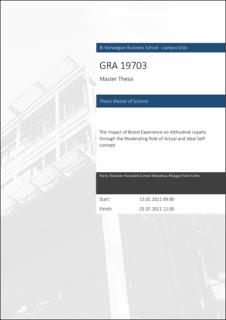The Impact of Brand Experience on Attitudinal Loyalty through the Moderating Role of Actual and Ideal Self- concept
Master thesis
Permanent lenke
https://hdl.handle.net/11250/2789089Utgivelsesdato
2021Metadata
Vis full innførselSamlinger
- Master of Science [1621]
Sammendrag
This thesis examines which brand experience dimension(s) are most effective in achieving attitudinal loyalty depending on whether they were presented in either an actual or ideal self-concept context. Drawing on branding, self-concept, and loyalty literature, this research paper aims to empirically address this research question by constructing a conceptual framework and testing it using three independent quantitative studies. This analysis builds upon previous literature’s findings by providing insight into the context-specific nature of the relationship between brand experience and attitudinal loyalty. Furthermore, it sheds light on self-concept’s facilitating role in this relationship, as it demonstrates the sense of self’s ability to influence derived brand meanings.
The initial findings of this research conclude that attitudinal loyalty does not differ by dimension nor self-concept. However, upon further examination, there is supporting evidence of a cross-over interaction between self-concept and brand experience dimensions, emphasizing the importance of brand experience’s contextual complexity. The results indicate that brands appealing to the ideal self- concept benefit more from sensorial and behavioral experiences, while brands that appeal to the actual self-concept benefit more from affective and cognitive experiences. This suggests that consumers’ self-views shape their internal subjective responses, meaning that self-concept can act as the cornerstone for careful and intentional experiential design. Therefore, brand experience should be analyzed with particular attention to exogenous factors to best capture its epistemological plurality.
Beskrivelse
Masteroppgave(MSc) in Master of Science in Business, Leadership and Change - Handelshøyskolen BI, 2021
